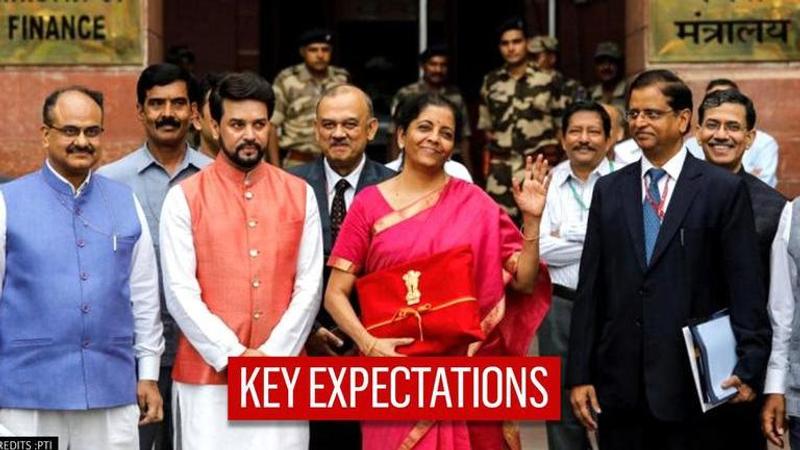Published 19:04 IST, January 18th 2021
From healthcare to divestment target; Here are key expectations from Union Budget 2021
Amid challenging times for the Indian economy, Union Finance Minister Nirmala Sitharaman will present the first paperless Union Budget on February 1, 2021.

Amid challenging times for the Indian economy, Union Finance Minister Nirmala Sitharaman will present the first paperless Union Budget on February 1, 2021. During the first quarter (April-June) of 2020-21, India's Gross Domestic Product crashed by 23.9% which was attributed to the fact that the country was among the economies worst hit by the COVID-19 pandemic. This was followed by a contraction of the GDP by 7.5% in the July-September quarter. As this marked the second quarter in a row where the country's GDP contracted, India plunged into a technical recession. In a heartening development though, sectors such as agriculture, forestry and fishing (3.4%), manufacturing (0.6%) and electricity, gas, water supply and other utility services (4.4%) recorded a positive GDP growth.
Amid a series of consultations with various stakeholders, Sitharaman held a pre-Budget meeting with the Finance Ministers of all states on Monday. She has promised a "Budget like never before," hinting that the Centre would take all possible steps to boost the Indian economy. The previous Budget entailed various initiatives such as a streamlined exam for employment, elimination of human interface in tax assessment, tax holidays for start-ups, Taxpayers’ Charter, increasing the insurance on bank deposits besides a focus on skill development, infrastructure and agriculture.
Here are some of the key expectations from the Budget:
- Focus on healthcare sector- As the COVID-19 period has underscored the need for better healthcare facilities in the country, the Centre might spend more on the healthcare sector. Reportedly, there can be an extension of tax benefits under Section 35AD. Moreover, an increase in deduction under Section 80D of the mediclaim premium is likely.
-
Relief on the Income Tax front- The budget is expected to ensure that people have more dispensable income owing to the fact that several people lost their jobs or suffered a pay cut due to the novel coronavirus-induced lockdown. It is speculated that the basic tax exemption limit for an individual might be raised from Rs.2.5 lakh to Rs.5 lakh for people below 60 years of age. The Union government may also introduce a COVID-19 cess on high-income earners.
-
Boost for infrastructure and employment- One of the priority areas of the government will be employment generation in the country. Therefore, a special focus is likely on sectors such as infrastructure, textiles, housing, MSME etc. which might help boost employment. Reports suggest that the Centre can liberalise FDI rules in construction apart from allocating a credit-linked subsidy for the home buyers. Additionally, the credit guarantee scheme for the MSMEs might be extended.
-
Less number of public sector banks- After the merger of 10 public sector banks into 4 big banks in 2019, there are only 12 public sector banks in the country at present. There is a likelihood of the number of public sector banks being reduced further through more mergers.
-
Improving the farm infrastructure- Amid the ongoing protests by farmers against the three agrarian laws, agriculture is expected to get more focus in the upcoming Budget. There has been a demand for strengthening the existing farmer producer organizations and the addition of more FPOs to ensure improved access to the markets, especially for small farmers. Furthermore, there might be an increased allocation of funds to fast-track projects like rural roads and irrigation and for development of warehousing facilities.
-
Revisiting the divestment target- For the fiscal year 2020-21, the Centre had set a divestment target of Rs. 2.1 lakh crore. As the privatization of government-owned entities such as Air India, BPCL etc. remains pending, Sitharaman might announce an increase in the divestment target in this year's Budget.
-
Change in fiscal deficit- The fiscal deficit, which is the difference between the total revenue and total expenditure for 2020-21, was pegged at 3.5%. The Union Finance Minister had defended not raising the fiscal deficit to a higher level such as 4.5% citing that excess borrowing would have an impact on the Budget as well as the consolidated fund. According to reports, the Centre might follow a relaxed fiscal roadmap to bring down the budget deficit to 4% of GDP by 2025-26. This shall require amendments to the Fiscal Responsibility and Budget Management Act.
Updated 19:04 IST, January 18th 2021




